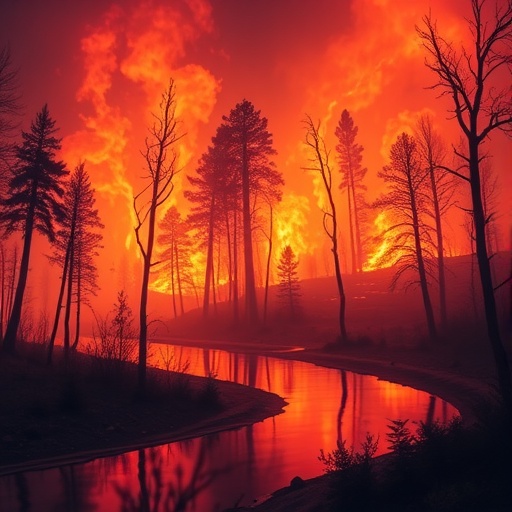The increased frequency and intensity of wildfires pose a significant risk to communities, particularly in urban areas where the impact is not only limited to property destruction but extends to public health threats. Recent research from the University of Technology Sydney (UTS) sheds light on how wildfires can contaminate drinking water distribution systems, raising alarming health concerns. This issue is further compounded by the growing prevalence of extreme weather conditions driven by climate change, making it a pressing topic of public interest.
The critical findings from researchers at UTS highlight that wildfires can introduce volatile organic compounds (VOCs) into drinking water sources, endangering the health of millions. Notably, the study draws attention to the fact that nearly half a billion people globally have experienced wildfires within one kilometer of their homes over the past two decades. This statistic underscores the urgent need for comprehensive monitoring and proactive measures to mitigate these risks.
VOCs can enter drinking water systems through mechanisms such as thermal degradation of plastic pipes or the infiltration of smoke into depressurized piping systems. Once these harmful compounds infiltrate the water distribution network, they can be transported through interconnected pipes, infiltrating various materials used in the water system and persisting for extended periods. This contamination poses serious health risks, particularly in vulnerable populations, including children and the elderly.
One of the most concerning compounds detected post-wildfire is benzene, a known carcinogen. For instance, data from the aftermath of the 2017 Santa Rosa wildfire revealed alarming levels of benzene persisting nearly a year later, highlighting the long-term risks posed by such contaminants in drinking water. Experts emphasize that even short-term exposure to low levels of benzene can adversely affect children’s health, while long-term exposure significantly elevates the risk of developing leukemia and other serious health conditions.
The implications of these findings are profound, particularly for officials managing public health and safety. Researchers at UTS call for robust monitoring and testing protocols to identify and address the presence of wildfire-related VOCs in drinking water systems. There is an urgent need for regulatory frameworks that define safety limits for these contaminants, ensuring public health is not compromised in the face of increasing wildfire threats.
Furthermore, the study emphasizes the correlation between the severity of wildfires and the level of VOC contamination detected in drinking water. As urbanization continues and climate change exacerbates wildfire conditions, the threat posed to water safety will likely increase, necessitating immediate action from governmental and regulatory bodies.
In light of these revelations, community awareness is crucial. Many individuals remain unaware of the potential dangers lurking in their drinking water as a direct consequence of nearby wildfires. Education and outreach initiatives can play a pivotal role in informing residents about the risks and the importance of water safety monitoring, especially in wildfire-prone regions.
Additionally, researchers advocate for an integrated approach to water safety, emphasizing collaboration among various stakeholders, including environmental agencies, health officials, and urban planners. By working together, these groups can develop comprehensive strategies that not only address immediate contamination concerns but also promote long-term resilience against future wildfire risks.
Innovative technological solutions may also play a key role in enhancing water safety. Advanced monitoring systems that utilize real-time data analysis could provide early warnings of contamination, enabling quicker responses and preventative measures. Investing in infrastructure improvements, such as fire-resistant materials for water pipelines, could also help mitigate risks associated with thermal degradation during wildfires.
The interplay between wildfires, climate change, and public health poses challenges that require urgent attention. The findings from UTS serve as a clarion call for enhanced vigilance and preventive measures to protect drinking water safety in the face of an increasingly unpredictable climate. As communities grapple with the realities of climate-induced disasters, prioritizing public health and environmental safety will be essential to building resilient urban futures.
The research letter detailing these findings, titled “Wildfires jeopardize drinking water safety,” is a critical contribution to the ongoing discourse surrounding environmental health and urban safety. Scholars, policymakers, and public health officials must heed these warnings and take actionable steps to safeguard their communities.
By fostering greater awareness and developing comprehensive monitoring strategies, society can mitigate the impact of wildfires on drinking water safety and protect public health for generations to come.
Subject of Research:
Article Title: Wildfires jeopardize drinking water safety
News Publication Date: 10-Apr-2025
Web References:
References:
Image Credits:
Keywords
Wildfires, Drinking Water, Contamination, Public Health, Environmental Safety, Climate Change, Volatile Organic Compounds, Benzene, Urban Areas, Water Monitoring
Tags: climate change and public healthextreme weather effects on water qualityhealth risks from wildfire smokemonitoring water contamination from wildfiresproactive measures for water safetypublic health threats from wildfiresUniversity of Technology Sydney research findingsurban wildfire impact on communitiesvolatile organic compounds in water systemswater distribution system vulnerabilitieswildfire effects on urban areaswildfire risks to drinking water safety





